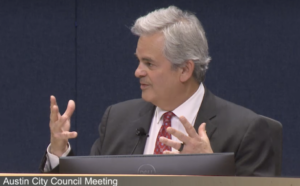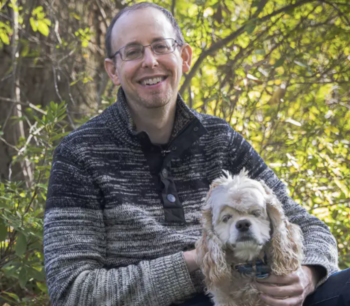As in horse racing, the bugler has sounded, “Call to the Post” for the Austin City Council campaigns that are now officially underway.
A well known variation on the Golden Rule is that, “Whoever has the gold makes the rules.” That was definitely the case in the 2022 election of Mayor Kirk Watson and five council members.
Our detailed analysis of campaign finances for the 2022 election showed that in the contest to fill all six contested seats, the candidates who raised the most money won. Every. Single. Time.
Despite the 2024 election being 10 months off, the nine candidates who filed campaign finance reports raised a combined total of nearly $284,000 and have $271,000 cash on hand.
The campaign finance reports for all candidates are listed and linked at the bottom of this story.
Running for mayor

Attorney Kirk Watson, age 66 (aka “Austin’s $2 million mayor”) won a two-year term in 2022, so now he’s has to do it all over again. He hasn’t actually announced his intentions to run for reelection but he does have a placeholder website published, where you can sign up for his email list.
 Perhaps to his relief, his chief opponent in 2022, Celia Israel—the person he beat by a mere 940 votes out the 114,188 ballots cast—won’t be in his face for the 2024 election. She’s busy campaigning to be the next Travis County Tax Assessor-Collector.
Perhaps to his relief, his chief opponent in 2022, Celia Israel—the person he beat by a mere 940 votes out the 114,188 ballots cast—won’t be in his face for the 2024 election. She’s busy campaigning to be the next Travis County Tax Assessor-Collector.
So Watson has started his 2024 reelection campaign by doing nothing to raise money by the December 31st deadline for these reports. Then again, he did the same thing in his last run for mayor. He didn’t file a campaign finance report until July 15, 2022. By that time he had scared up a staggering $1 million—$997,465 to be exact.
Watson was first elected to be Austin’s mayor in 1997. He was reelected in 2000. He won six elections for the Texas Senate (2008-2018). In other words, he’s a political war horse and has no need to make a preemptive show of financial force this early.
After all, election day’s not till November 5th.
Tovo’s entry changes everything
But Watson’s reelection chances took on a whole new challenge January 18th when former Council Member Kathie Tovo announced she was running for mayor. Tovo, 54, was first elected in 2011 after jumping in on March 11th to oppose incumbent Council Member Randi Shade. Despite starting her campaign just nine weeks before the general election of May 14, 2011, Tovo netted 46 percent of the votes to Shade’s 33 percent. Tovo then went on to beat Shade in the runoff with 56 percent.
In that 2011 election, however, Tovo had a decided advantage: Shade and the entire City Council was being investigated by the Travis County attorney for criminal violations of the Texas Open Meetings Act. That investigation was triggered by the Bulldog’s investigative report, “Open Meetings, Closed Minds.” Three of the council members under investigation were up for reelection in 2011 but the other two had weak opponents, and gained reelection.
Tovo doesn’t have that advantage in facing Watson. While he’s skirted the law, as the Bulldog reported here and here, there’s no dark cloud of prosecution hanging over his head. If Tovo is to unseat Watson, she will have to win support by challenging his leadership and his policies while convincing voters she’s the best person to take Austin forward.
Because Tovo announced her candidacy in 2024 she did not have to file a campaign finance report for the period ending December 31, 2023. She can accept donations through her campaign website
Beating incumbent mayors hard, not impossible
But it’s been 36 years since any accomplished that feat. The following analysis reflects the results of five mayoral elections over the last four decades in which a sitting mayor faced a significant challenge. This analysis ignores the reelection campaigns of mayors who faced only token opposition.
The last two elections involved former female council members who decided to challenge a sitting mayor, both times resulting in particularly poor showings.
⬆ 1985 Cooksey v. Mullen—Attorney Frank Cooksey bested incumbent Mayor Ron Mullen with 54 percent of the votes in a runoff.
⬆ 1988 Cooke v. Cooksey—Former Council Member Lee Cooke beat incumbent Mayor Cooksey with 58 percent in a runoff.
⬇ 1994 Slusher v. Todd—Austin Chronicle Politics Editor Daryl Slusher came practically out of nowhere yet scored within a whisker of unseating incumbent Mayor Bruce Todd. Slusher pulled 32 percent of the votes in the general election, forcing Todd with 46 percent into a runoff. Todd won the runoff by 1,359 votes.
⬇ 2012 Shea v. Leffingwell—Former Council Member Brigid Shea got 37 percent of the votes in the general election—not enough to force incumbent Mayor Lee Leffingwell into a runoff, as he won with 52 percent.
⬇ 2018 Morrison v. Adler—Former Council Member Laura Morrison’s bid to beat incumbent Mayor Steve Adler resulted in the worst possible outcome for the challenger. Adler whipped her with a whopping 40-point margin of 59 percent to 19 percent, without a runoff.
Should Tovo surmount the odds and unseat Watson, she will become Austin’s second-ever woman mayor. The first was Carole Keeton McClellan. She was first elected in 1977, then reelected in 1979 and 1981.
But even she (as Carole Keeton Strayhorn) was not able to make the comeback to win the mayor’s job again. After holding office as State Comptroller, she ran for mayor again in 2009 when there was no incumbent. She placed third in the general election with 21 percent of the votes, while Lee Leffingwell went on to win the runoff.
Running for District 2

No one has appointed a campaign treasurer to declare they’re running against incumbent Vanessa Fuentes, 37.
Despite being outspent in 2020 by David Chincanchen in a four-candidate race to win the District 2 seat, Fuentes got more than 56 percent of the votes to win without a runoff.
She cast herself in that election campaign as a “policy expert” who had worked for State Representative Abel Herrera (D-Robstown) and later as a grassroots advocacy strategist for the American Heart Association. (The Bulldog’s profile on Fuentes and her 2020 opponents was published October 15, 2020.)
Given the political axiom that says everyone should run like they’re losing, Fuentes wasted no time in starting to raise money for her reelection bid.
She attracted individual donations totaling almost $46,000. She’s spent little so far and has upwards of $40,000 left on hand. She’s accepting donations through her reelection campaign website.
The $3,400 in loans Fuentes reported includes more than $2,800 carried over from her 2020 campaign.
Running for District 4

Incumbent Jose “Chito” Vela, 49 also has not yet drawn an opponent. And like her, he’s chasing down all the contributions he can get.
The Bulldog’s profiled Vela, an attorney practicing immigration and criminal defense law, during his 2020 campaign.
You can donate via his reelection website, where apparently lots of folks already have. He reported contributions of $63,000 already—the most so far for any candidate for 2024.
The $10,500 in loans that Vela reported represents a campaign debt carried over from his 2020 election campaign.
Running for District 6

Mackenzie Kelly, 37, is the only other incumbent running for reelection who has attracted an opponent, that being Krista Laine, 50.
Kelly reported raising nearly $42,000 by December 31st, while newcomer Laine tallied nearly $16,000.
Kelly is accepting campaign donations through a website. Laine also has a website to take donations.
Kelly is also the only Republican currently on the council dais. While council elections are technically nonpartisan, Austin’s election history has repeatedly demonstrated that voters care about the candidates’ party affiliations. Laine is a Democrat.
When Austin implemented elections from 10 geographic districts in 2014, three of the seats were captured by Republicans: Don Zimmerman in District 6, Ellen Troxclair in District 8, and Sheri Gallo in District 10.
In 2016 Zimmerman was knocked out of office by Flannigan. Gallo also lost to Alison Alter that year.
Laine was president of Access Education RRISD when in 2022 the organization endorsed all five candidates who won election or reelection to the Round Rock ISD’s Board of Trustees. One of the defeated candidates was none other than former Austin Council Member Don Zimmerman. He was part of the far-right slate of conservatives called Round Rock One Family, which wanted to ban books in school libraries and opposed accommodation of LGBT students. Zimmerman challenged board president Tiffanie Harrison, who snared 62 percent of the votes to win reelection.
The Bulldog detailed Kelly’s 2020 candidacy in the heat of her runoff campaign against incumbent Council Member Jimmy Flannigan.
Given the District 6 seat has swung from Republican to Democrat and back again with Kelly’s election, it will be interesting to see which way the political weather vane blows in 2024.
Kelly recently published an opinion piece in the Austin American-Statesman that candidly discussed her mental health challenges, which she attributed to domestic violence trauma and distressing incidents she witnessed as a volunteer firefighter. To assist her in coping with these issues she is now is accompanied by her small Havenese service dog, Frank. The City’s Human Resources Department has approved Kelly’s right under the Americans with Disabilities Act to be accompanied everywhere she is required to access as part of her council duties.
Running for District 7

Four candidates have so far declared they want to succeed Leslie Pool on the council dais by appointing campaign treasurers.
Edwin Bautista, 26, reported raising just $240 through the end of last year. He works as a management assistant at Texas Housers, a nonprofit that helps low-income Texans to buy affordable homes in quality neighborhoods. He’s accepting donations on his campaign website.
Pierre Nguyen, 35, hasn’t yet filed a campaign finance report. He responded to the Bulldog’s text message by saying he’s currently training with the Coast Guard and “will be submitting my finance report in the next couple of days.” He’s the son of Vietnamese immigrants and works full-time as a firefighter with Travis County Emergency Services District 8. Donations to his campaign can be made on his campaign website.
Adam Powell, 29, raised slightly more than $12,000. He’s campaigning full-time. His most recent job was as chief of staff for a company that aims to transform the business of sports and entertainment by measuring the value of sponsorships. Before that he worked for three years at the Texas Education Agency as a “talent acquisition specialist.” He’s accepting campaign donations on his website.
Mike Siegel, 46, is an attorney who cofounded the nonprofit Ground Game Texas, whose mission is to build coalitions for progressive wins for Texas communities. He is adept at fundraising, given the skills developed as a two-time congressional candidate running against an entrenched Republican opponent. For his council campaign he has so far raised more than $57,000, second only to District 4 incumbent Vela. Donations may be made on Siegel’s campaign website.
The Bulldog reported on Bautista, Nguyen and Siegel last October 31st. (Powell will be profiled later.)
Running for District 10

The Bulldog profiled opponents Marc Duchen and Ashika Ganguly December 14th. He was born in South Africa and emigrated to the United States at age 4 and became a naturalized U.S. citizen at age 12. She is the daughter of Indian immigrants who came to this country for graduate studies and stayed. She was born in Austin.
Duchen, 45, is a longtime neighborhood activist and himself an experienced campaign manager. He kickstarted his own run for council with a personal loan of $10,000 and raised more than $12,000 as of December 31st.
Ganguly, who turns 29 next month, is a former school teacher who worked last year as legislative director for State Representative John Bucy (D-Cedar Park). She launched her website early on and lined up a long list of endorsements. Through the end of last year she raked up $35,000 in donations.
 Trust indicators: Ken Martin has been covering local government, politics, and elections in the Austin area since 1981. He wrote the Ron Mullen portion of Third Coast magazine’s March 1983 issue. That’s when incumbent Council Member Mullen ran for mayor against former Council Member Lowell Lebermann. Mullen won. The cover photo was so cleverly done that you couldn’t recognize that Lebermann was blind. See more on Ken on the About page. Email [email protected].
Trust indicators: Ken Martin has been covering local government, politics, and elections in the Austin area since 1981. He wrote the Ron Mullen portion of Third Coast magazine’s March 1983 issue. That’s when incumbent Council Member Mullen ran for mayor against former Council Member Lowell Lebermann. Mullen won. The cover photo was so cleverly done that you couldn’t recognize that Lebermann was blind. See more on Ken on the About page. Email [email protected].
Related documents:
Campaign Finance Report for Edwin Bautista
Campaign Finance Report for Marc Duchen
Campaign Finance Report for Ashika Ganguly
Campaign Finance Report for Vanessa Fuentes
Campaign Finance Report for Mackenzie Kelly
Campaign Finance Report for Krista Laine
Campaign Finance Report for Adam Powell
Campaign Finance Report for Mike Siegel (Corrected)
Campaign Finance Report for Jose “Chito” Vela
Campaign Finance Report for Kirk Watson
Related Bulldog coverage:
District 10 council candidates jump in early, December 14, 2023
Siegel running for City Council District 7, October 31, 2023












 Trust indicators: Ken Martin has been doing investigative reporting in the three-county Austin metro area since 1981. Email
Trust indicators: Ken Martin has been doing investigative reporting in the three-county Austin metro area since 1981. Email 














 Trust indicators: Ken Martin has been covering local government and politics in the Austin area since 1981. See more about Ken on the
Trust indicators: Ken Martin has been covering local government and politics in the Austin area since 1981. See more about Ken on the 





Ethics? Who gives a damn?
“I want all of you to get up out of your chairs. I want you to get up right now, and go to the window, open it and stick your head out and yell, ‘I’m mad as hell and I’m not going to take this anymore!’ Things have got to change. But first, you’ve gotta get mad! You’ve got to say, ‘I’m mad as hell, and I’m not going to take this anymore!’ ” — Howard Beale (Peter Finch) addressing his live television audience in the 1976 movie, “Network”
The City of Austin apparently doesn’t give a damn that its moral compass is seriously out of whack.
Many of the City’s elected leaders are themselves exemplars of bad behavior.
Not one of the City’s elected leaders have shown interest in reforms.
A solution was offered and rejected twice: The 2018 Charter Review Commission recommended giving voters a chance to establish an Independent Ethics Commission. That idea was ignored by the 2018 City Council. The 2024 Charter Review Commission recently debated the proposal and chose not to revive it.
The City of Austin has proven it’s incapable of repairing its moral compass.
If Austin citizens want a more ethical government they’re going to have to fight for it.
Why this harsh attack, and why now?
Examples of the City’s ethical blind spots are plentiful. The evidence is beyond a reasonable doubt.
Consider the following examples—all of which the Bulldog has previously reported, to no avail.
This story combines all those reports in a single overview that more powerfully describes the ethical illness this city suffers.
Are citizens so turned off and tuned out of civic affairs that they don’t give a damn either?
Why aren’t citizens mad as hell and not going to take this anymore?
Council members’ criminal behavior—The Bulldog reported that six of Austin’s current council members—Ryan Alter, Natasha Harper-Madison, Mackenzie Kelly, Leslie Pool, Zohaib “Zo” Qadri, and Jose “Chito” Vela—appear to have criminally violated the city’s lobby law.
These violations fall within the jurisdiction of the Ethics Review Commission. These offenses also could be prosecuted by the City Attorney. But as this story reported, the City Attorney has not once taken action on these and similar violations.
City Attorney Anne Morgan did not respond to answer questions the Bulldog emailed to her January 26th. The questions asked what action, if any, the City Attorney’s office has taken to prosecute these lobby law violations and two reports about council candidates who failed to file required reports.
Council members’ ethical violations—The Bulldog reported that three current council members—Paige Ellis, Harper-Madison, and Jose Velasquez—have been sanctioned for ethics violations.
Council ignores ethics reforms—The Bulldog reported that the council’s Audit and Finance Committee at three consecutive meetings heard members of the City’s Ethics Review Commission as they advocated for two recommendations:
Commissioner Betsy Greenberg told the Committee, “As council members, one of your important responsibilities is making decisions about land use. Members of the public need to be assured that the mayor and council members do not have conflicts of interest when making these decisions.”
Commissioner Mary Kahle said, “I believe both of these proposed changes—by increasing transparency and accountability—will support a stronger, more responsive city government for all Austin residents. I hope you will consider including them for eventual consideration by the City Council.”
Those recommendations were never taken up by the City Council because not a single City Council member would sponsor putting them on the agenda for discussion.
It should be noted that although the City does not publish personal financial disclosures of council members and candidates, the Bulldog does so when reporting on election campaigns. We obtain disclosures by filing public information requests. The personal financial disclosures of current council members may be accessed through the Bulldog’s Government Accountability Project.
What else has been ignored?
Candidates didn’t file financial disclosures—The Bulldog reported that more than a third of City Council candidates running in 2022 failed to file personal financial reports. These reports provide information the public needs in order to monitor candidates and elected officials for conflicts of interest.
Local Government Code Section 145.004 requires candidates for municipal office to file these reports. Local Government Code Section 145.009 states that a candidate who fails to do so commits a Class B criminal misdemeanor.
Candidates didn’t file campaign finance reports—The Bulldog reported that 17 candidates—exactly half the number who filed for a place on the ballot in 2022—failed to file a campaign finance report.
Citizen complaints about these violations could have been filed with the City Clerk for consideration by the Ethics Review Commission.
In addition, citizen complaints could have been filed with the Texas Ethics Commission. Candidates for local offices who fail to timely file campaign finance reports may face a civil penalty from the Texas Ethics Commission of up to $5,000 or triple the amount at issue.
The Texas Ethics Commission encourages individuals who are aware of a violation to report it by filing a complaint with the Commission.
Austin’s ethics enforcement weak by design
The 11-member Ethics Review Commission is composed of volunteer political appointees. Most if not all of its members lack expertise in the byzantine complexities of campaign finance, ethics, financial disclosure, conflicts of interests, and lobbying regulations—all of which are within the commission’s jurisdiction to enforce.
Attorney Fred Lewis—a longtime critic of what he believes is a fatally flawed Ethics Review Commission—told the Bulldog, “The Commission needs expertise and independence. You cannot have good campaign finance or ethics compliance without enforcement. It’s pure law enforcement.”
Aside from those disadvantages, the commission has several mortal weaknesses:
Lacks investigative powers—The Ethics Review Commission has no investigative authority. As a result the Ethics Review Commission must turn a blind eye to wrongdoing—even when gross violations have been exposed by media coverage.
Sworn complaint required—The commission cannot even begin to examine alleged wrongdoing unless someone files a sworn complaint with the City Clerk about matters within the commission’s jurisdiction.
Six votes required—The commission’s bylaws require six votes to approve anything—even if only six members attend a meeting. This makes it virtually impossible for the commission to conduct hearings and produce results that are fair to both the complainant and respondent.
Case in point is the commission meeting of June 5, 2023. The meeting convened a half-hour late because it was waiting for a sixth member to arrive and create a quorum. At the time the 11-member commission had three vacancies. Two other members were absent.
Once it assembled a quorum, the commission conducted separate preliminary hearings about two complaints. The same complainant alleged conflicts of interest involving a member of the Design Commission and a member of the Environmental Commission.
In each of the hearings serious red flags were raised about the commissioners’ conduct. The votes to schedule the complaints for final hearings were 4-2 in favor and 5-1 in favor. Had the commission been up to strength the outcome would have more than likely resulted in scheduling final hearings. Instead, the complaints were dismissed.
Citizen action required
“There is no question that the City of Austin’s Ethics Review Commission is a farce, appointed by council members whose issues they review, chosen for ideological reasons, and usually with zero legal or campaign finance experience whatsoever,” said Matt Mackowiak, cofounder of Save Austin Now, and chairman of the Travis County Republican Party.
“Austin voters should demand improved and tightened ethics rules and a truly independent commission. You either believe in good government and transparency, or you don’t.”
The City appears to be incapable of policing itself. Given the status quo, the responsibility for initiating action against violators rests entirely with citizens.
Are citizens “mad as hell and not going to take this anymore?”
Are citizens aware they must file a complaint before enforcement action is considered?
Do citizens know how to file a complaint with the City Clerk on this written form following these instructions?
Do citizens know how to file a complaint with the Texas Ethics Commission? Know that they can file a complaint online after registering on the commission’s website? Or know they can file a notarized complaint in accordance with these instructions?
Complaints cannot be filed anonymously with the City or the Texas Ethics Commission: Are citizens afraid to step up and fill the enforcement void, subjecting themselves to the glare of publicity that may follow complaints?
Do citizens lack confidence in their ability to understand in sufficient detail the types of wrongdoing that might justify a complaint?
Independent Ethics Commission DOA 2018
It seems unrealistic to expect citizens to bear the heavy burden of policing the conduct of candidates and public officials. But that’s how it stands.
It doesn’t have to be that way.
The 2018 Charter Revision Commission studied the City’s ethics problems in great depth. Its members debated at length the duties, responsibilities, and funding needed to establish an Independent Ethics Commission.
On May 7, 2018, the Charter Review Commission recommended that the City Council put this proposed City Charter amendment (and eight others) on the ballot for voters to consider. That was six full months before the November 6, 2018, election.
Yet the City Council never discussed the recommendation.
Instead, at its meeting of June 28, 2018—four months before the November election—the council voted to put on the ballot the two least-consequential charter changes recommended.
Then, as now, elected officials showed no interest in establishing a body that might actually police their unacceptable behavior.
Effort to revive Independent Ethics Commission
Betsy Greenberg, was appointed to the 2024 Charter Review Commission last November. She previously served nearly four years on the Ethics Review Commission. On January 18th she made a slide presentation for the Charter Review Commission. She proposed to revive the six-year-old recommendation.
She asked commissioners to recommend the City Council put an Independent Ethics Commission on the November 5, 2024, ballot, which is nine months away.
“The most important piece is that the (current Charter Review) Commission will not need to reinvent the wheel to recommend an Independent Ethics Commission. Because the 2018 Charter Commission did all the work for us,” Greenberg said. “The (2018) City Council did not consider this.”
“Right now…there’s four entities that are involved in ethics matters,” Greenberg said. She listed the City Clerk, City Auditor, and Ethics Review Commission (all appointed by the City Council) and the City Attorney hired by the City Manager.
The idea is to roll all these functions into a single entity that stands apart from the City Council, City Manager, and City Attorney with responsibility and authority to enforce existing statutes and regulations.
The Independent Ethics Commission would be established using the same procedures that created the City’s Independent Citizens Redistricting Commission. That commission drew maps to create boundaries for 10 City Council districts used for the first time in the 2014 council elections, and later adjusted those boundaries after the 2020 census. All of which was accomplished with public acceptance and free of legal challenges that frequently follow partisan redistricting. The City Council is prohibited from interfering with the Redistricting Commission’s work.
The Independent Ethics Commission would be free to straightforwardly enforce ethical mandates that the City Council itself has enacted or that voters approved to amend applicable ordinances or the Austin City Charter.
It would have authority to conduct investigations, seek injunctions, and prosecute alleged civil violations. It could refer criminal violations to Austin’s Municipal Court or other appropriate jurisdictions.
“The public has the right to transparency and accountability from our public officials, from our candidates, and from political action committees,” Greenberg said. “An Independent Ethics Commission that’s free to operate without political influence would help us achieve this goal.”
“The 2018 (Charter Review) Commission did so much work and the Council unfortunately didn’t even consider it. We should give the Council the chance to consider this,” Greenberg said in completing her presentation.
Details about the composition, powers, and duties of the Independent Ethics Commission are laid out in the 11-page Appendix D to recommendations of the 2018 Charter Review Commission.
Independent Ethics Commission DOA 2024
Attorney Jessica Palvino chairs the 2024 Charter Review Commission. She also chaired the 2018 commission that created and recommended the proposal for an Independent Ethics Commission.
“We did great work and it’s a great start,” Palvino told commissioners. “I do think this commission, though, would need to devote significant time and attention to this.”
Palvino reminded commissioners that it had four scheduled meetings left. To consider this matter would require formation of a working group. “If we do want to create another working group, I think we need to reevaluate our schedule….”
When Palvino asked for comment about the proposal it triggered a long and far ranging discussion among the commissioners.
Many points of view were aired.
Commissioner Julio Gonzalez Altamirano doubted that “Austin has an ethical crisis…No one is complaining…Maybe they should be concerned.”
He expressed reservations about creating a group of people that are accountable to no one once appointed. He said the proposal “is potentially very dangerous.”
“If we want to create another working group, we can do that,” Altamirano added. “If we do, I think we need to look at our meeting schedule to make sure that we give ourselves sufficient time to do this issue justice.”
Commissioner Cynthia Van Maanen, executive director of the Travis County Democratic Party, said the proposal contains so much information that in addition to the working group the commission would need to devote time to “really go through these things and hear from a lot of folks.” She mentioned people who have expertise in campaign finance, lobbyists, and political consultants.
At the end of the Charter Review Commission’s meeting, Commissioner Greenberg’s motion to form a working group failed to get a second.
DOA. Again.
Attorney Fred Lewis served on the 2018 Charter Review Commission and was heavily involved in drafting the recommendation to establish an Independent Ethics Commission. He said the proposal fails to gain traction because Austin’s elected officials suffer from an erroneous self-image.
“The problem is the mind-set that, ‘We’re liberal, we don’t have ethics issues,’ ” Lewis said. “But ethics issues are not partisan based—they’re human nature.
The attitude is, “We’re all Democrats, we’re part of the establishment. We don’t want to look bad—even if do bad shit,” Lewis said.
“It’s a joke.”
Big scandals bring big reforms
Attorney Bill Aleshire’s involvement in progressive politics goes back to 1973 when he was a legislative aide. That session convened in the wake of the Sharpstown scandal of 1971-1972 that rocked Texas politics and ended the careers of men in the highest levels of state government.
The scandal triggered sweeping changes in the 1973 session, according to Wikipedia. “The lawmakers…passed a series of far-reaching reform laws. The legislation required state officials to disclose their sources of income, forced candidates to make public more details about their campaign finances, opened up most governmental records to citizen scrutiny, expanded the requirement for open meetings of governmental policy-making agencies, and imposed new disclosure regulations on paid lobbyists.”
“Those times were my personal base for professional life seeking government transparency and accountability,” Aleshire said. Fifty years later, after serving as Travis County Tax Assessor-Collector and Travis County Judge, he is no less passionate.
“Why should we care that government is honest? Because in a democracy we need to be able to respect government and hold it accountable,” Aleshire said. “Otherwise it undermines people’s trust in government. That’s not healthy for democracy. Americans shouldn’t accept it.”
(Disclosure: Aleshire represents the Bulldog in public information requests. In 2011 he twice successfully sued the City of Austin for failure to provide public information the Bulldog had requested.)
Does Austin need another scandal?
The examples of unpunished wrongdoing listed in this story have not drawn much interest. They have not created the uproar and county attorney’s criminal investigation triggered by one of the Bulldog’s previous investigative reports.
That one exposed the Austin City Council’s institutionalized practice of violating the Texas Open Meetings Act. When the county attorney’s investigation was finished the City Council members were given an offer they couldn’t refuse: Sign deferred prosecution agreements or be charged with criminal offenses and, if convicted, serve jail time and forfeit their offices.
What we face now is the City of Austin’s seemingly inexhaustible tolerance for bad conduct. It’s a City headed by elected officials with no appetite for reform and a City Attorney who looks the other way.
One possible solution that might have overcome the City’s de facto indifference—by allowing voters an opportunity to amend the City Charter to establish a watchdog Independent Ethics Commission—has once again been sidelined.
If the citizens of Austin want ethical government, they’re going to have to fight for it.
Otherwise, it’s “Laissez les mauvais moments rouler.”
Let the bad times roll.
This article was updated at 2:56pm January 29, 2023, to correct the name of one of the three council members who have been sanctioned for ethics violations. Also to correct the position title of Cynthia Van Maanan in the Travis County Democratic Party.
Related documents:
Ethics Review Commission Recommendation to require the City Clerk to post to the City’s website the financial disclosures filed by city elected officials and candidates for elective office for the city, July 27, 2022 (2 pages)
Ethics Review Commission Recommendation to require disclosure of all legal, beneficial, or equitable interest in which a City Official has a substantial interest in real property, July 27, 2022 (2 pages)
Proposed Independent Ethics Commission Charter Amendment, (See Appendix D) to the 2018 Charter Review Commission Report to the City Council, May 7, 2018 (11 pages)
Slide presentation Betsy Greenberg made to the 2024 Charter Review Commission, January 18, 2024 (14 pages)
Related Bulldog coverage:
Six council members and numerous lobbyists appear to have criminally violated city’s lobby law, October 17, 2023
Velasquez third council member sanctioned for ethics violations, August 26, 2023
Council not anxious to publish financial disclosures, March 21, 2023
Austin’s got a $2 million mayor, January 26, 2023
Want to get elected but not be accountable?, September 28, 2022
Charter revisions flushed down the drain, June 28, 2018
Nine charter revisions recommended, May 8, 2018